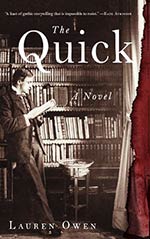
![]() Rhondak101
Rhondak101
3/12/2015
![]()
SPOILER ALERT!
SPOILER ALERT!
SPOILER ALERT!
SPOILER ALERT!
SPOILER ALERT!
SPOILER ALERT!
SPOILER ALERT!
SPOILER ALERT!
SPOILER ALERT!
SPOILER ALERT!
SPOILER ALERT!
SPOILER ALERT!
I usually don't worry too much about spoiler alerts unless there is a mystery involved and I am revealing something that will decidedly ruin the book for the reader. I'm not certain that this is the kind of spoiler, but I am respecting the will of the publishers.
I find it extremely sad that Twilight and the slew of teen paranormal romances that followed it have made the word "vampire" publishing poison. The Quick is a vampire book, but the word only shows up more than 100 pages in and is rarely used afterward. The publicity for this book never hints that the book is a vampire novel and reviews rarely mention it. Lauren Owens creates a plausible incarnation of vampire, who participates in many of the old rituals but are not clichéd or overworked. In this world, vampires are not sexy or romantic. They are not benign nor are they the avowed enemy of humans. They dislike humans because they are loud (their voices, their heartbeats, their thoughts), smell of blood and are so very inferior to them. The vampires are male, powerful, and from good families. They are all part of a gentleman's club, called the Aegolius. These vampires call the other vampires, the ones that don't fit their gender or social requirements, the Alia (Latin for the other). These characters are very Dickensian in their conception and are ruled by a matriarchal vampire.
The Quick is also a Victorian novel. Lauren Owens handles the Victorian elements well possibly because he holds an M. A. in Victorian literature. The novel has characters that remind you of those in Charles Dickens, Oscar Wilde, or later works like Evelyn Waugh. The blurb promises that our female heroine--while searching for her lost brother--will meet "unforgettable characters," such as "a female rope walker turned vigilante." Owens limns a very plausible Victorian character in this rope walker, Adeline Swift. Often when authors create such outré female characters, they make them too modern, breaking all social boundaries rather than just those that allow the character to accomplish her goals and live her life within a very rule-bound society.
Detractors of this book will say that it is slow and is told from too many points of view. These were two of the things that I enjoyed. The first fifth of the book does remind me of an Evelyn Waugh novel about the life of young, educated, leisured Victorian males. Afterwards, the book begins to mix styles and points of view. The second section contains the journal of a tutor who comes in contact with a former pupil tapped to become a vampire. Other sections follow Charlotte, the sister of a young man who goes missing and Liza, one of the young Alia. Each of these voices is clear and adds something to the overall worldview. Even when some journals seem unclear, later narrative pieces clarify them.